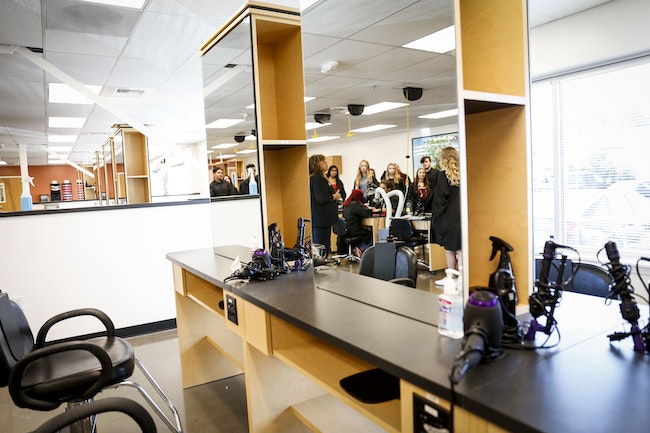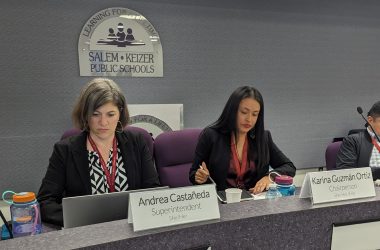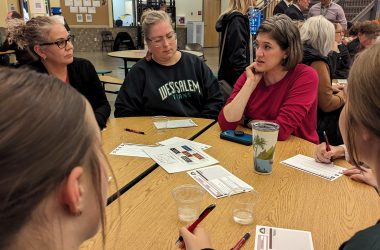 The school district salon at the Career Technical Education Center awaits both students and customers. (Moriah Ratner/Special to Salem Reporter)
The school district salon at the Career Technical Education Center awaits both students and customers. (Moriah Ratner/Special to Salem Reporter)
As Salem-Keizer teachers and principals prepare for remote classes, Rhonda Rhodes has more unusual questions than the average administrator.
She’s the principal of the district’s Career Technical Education Center, a building on Portland Road where high school juniors and seniors study one of 10 career-focused programs, learning math through reviewing construction blueprints or English by writing police reports.
“We want our students to be working hands-on. You can do a lot virtually, you can do a lot online but the best way to learn to repair a car is to get on that vehicle, pull dents, repair that panel,” she said.
The earliest the center could open for students in-person is November. Superintendent Christy Perry announced last week the district would wait until the end of the first fall grading period, nine weeks into the year, before considering in-person classes. That’s only possible if Marion County meets state metrics for new cases of Covid and the percentage of tests coming back positive.
Career technical education programs get more leeway – they’re among a handful of “exceptions” Gov. Kate Brown listed last week that could hold in-person classes with more cases, along with kindergarten through third grade instruction and remote and rural schools. Still, for the past month, Marion County has reported more than double the number of new cases allowed to reopen even limited programs.
Rhodes said she’s working to bring industry experts in virtually to talk to students and teach them how adults in their chosen career fields are adapting to the same challenges of a pandemic.
“Right now, because everyone is having this issue, there are a lot of shared ideas and shared technology and shared resources,” she said.
For cosmetology, that means learning from beauty schools who are retooling their programs for the virtual world. Rhodes said some have adapted by sending students home with a haircutting kit and mannequin head to practice on.
“They’re able to video or livestream themselves performing a haircut” and get feedback from an instructor, she said.
 Rhonda Rhodes, principal at the Career Technical Education Center. (Moriah Ratner/Special to Salem Reporter)
Rhonda Rhodes, principal at the Career Technical Education Center. (Moriah Ratner/Special to Salem Reporter)
Agri-science students may be growing plants in their kitchens. Manufacturing and welding students will use virtual demonstrations of equipment, and instructors in the video game design program will tailor classes using free software students can access online where possible, Rhodes said.
Still, the challenges of virtual learning are apparent for the roughly 1,000 students enrolled in the center this fall.
Rhodes said instructors worked to bring industry experts in for Zoom sessions after schools closed in March, incorporating things like a livestreamed walk-through of an auto body shop or a Q&A with a video game producer.
“That was the most engaged we saw our students in the spring,” she said. But the center draws kids who do best with hands-on instruction, many of whom have struggled more in traditional classes. Many found the shift to classes with no grades “demotivating,” she said.
Rhodes said the center is well-positioned to host students and educators safely once classes resume. Housed in a former warehouse on Portland Road, the facility has enough space for each of its 10 programs to be separated from others, with individual entrances and exits from the building.
In a normal school year, students would attend class at the center two days per week and return to their neighborhood high school the other three days for regular classes. Rhodes said the district’s Covid plan would instead have students come only to CTEC, completing other classes virtually to minimize mixing between groups of students.
Many programs require some level of protective equipment already, like respirators for painting cars. Rhodes said they’re working to buy more, because students have previously shared specialized items like welding hoods.
Students will be graded and work on “foundational skills” so they can jump back to hands-on work as soon as they’re able.
“They can’t have a school year where they don’t learn and acquire the skills they need to be successful in their careers,” she said.
Rhodes said she’s confident instructors can keep students busy virtually as the year starts. But come November, she said it’s going to be critical to get high schoolers back in the building.
“This is hard for our students in particular because the promise of CTEC is you’re going to be doing,” she said.
SUPPORT ESSENTIAL REPORTING FOR SALEM – A subscription starts at $5 a month for around-the-clock access to stories and email alerts sent directly to you. Your support matters. Go HERE.
Contact reporter Rachel Alexander: [email protected] or 503-575-1241.

Rachel Alexander is Salem Reporter’s managing editor. She joined Salem Reporter when it was founded in 2018 and covers city news, education, nonprofits and a little bit of everything else. She’s been a journalist in Oregon and Washington for a decade. Outside of work, she’s a skater and board member with Salem’s Cherry City Roller Derby and can often be found with her nose buried in a book.









